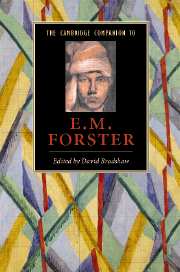Book contents
- Frontmatter
- Introduction
- 1 Forster’s life and life-writing
- 2 Bloomsbury and other values
- 3 Forster and England
- 4 Hellenism and the lure of Italy
- 5 Forster and the short story
- 6 Forster and the novel
- 7 Forsterian sexuality
- 8 Forster and women
- 9 A Room with a View
- 10 Howards End
- 11 Maurice
- 12 A Passage to India
- 13 Forster and modernism
- 14 Forster as literary critic
- 15 Filmed Forster
- 16 Postcolonial Forster
- Further reading
- Index
- Series List
10 - Howards End
Published online by Cambridge University Press: 28 September 2007
- Frontmatter
- Introduction
- 1 Forster’s life and life-writing
- 2 Bloomsbury and other values
- 3 Forster and England
- 4 Hellenism and the lure of Italy
- 5 Forster and the short story
- 6 Forster and the novel
- 7 Forsterian sexuality
- 8 Forster and women
- 9 A Room with a View
- 10 Howards End
- 11 Maurice
- 12 A Passage to India
- 13 Forster and modernism
- 14 Forster as literary critic
- 15 Filmed Forster
- 16 Postcolonial Forster
- Further reading
- Index
- Series List
Summary
Chalky cheese
No reader of the opening chapters of Howards End could fail to gather that the Schlegels and the Wilcoxes are meant to be contrasted. But whether these families are really as different as chalk and cheese is a conundrum that grows in significance as Forster's fourth novel unfolds. And even if a reader still thinks that the two households are fundamentally unalike in their conduct and convictions on completing the book, the thornier question of where Forster's deepest sympathies lie, with his heavy-handed idealists or his sports-mad philistines, may well remain unsettled. For despite its narrator's poise and its assured (if sparse) social comedy, not to mention the clear overlap between Forster's interests and those of the Schlegels, it is not Howards End's certainties that catch the eye but its hesitations, tensions, 'rich ambiguity . . . [and] fundamental irresolution'. Like Charles Wilcox and Aunt Juley on their fateful journey from Hilton station to Howards End, Forster can seem at 'cross-purposes' in this novel 'composed of contraries', yet that only makes it all the more intriguing in the context of his contrastdriven work as a whole and all the more absorbing in its own right. 'Whatever the flaws, weaknesses and contradictions we may perceive in Forster's own ideological position', Peter Widdowson comments astutely, '[Howards End], by containing them, gains rather than loses'.
- Type
- Chapter
- Information
- The Cambridge Companion to E. M. Forster , pp. 151 - 172Publisher: Cambridge University PressPrint publication year: 2007
- 5
- Cited by

